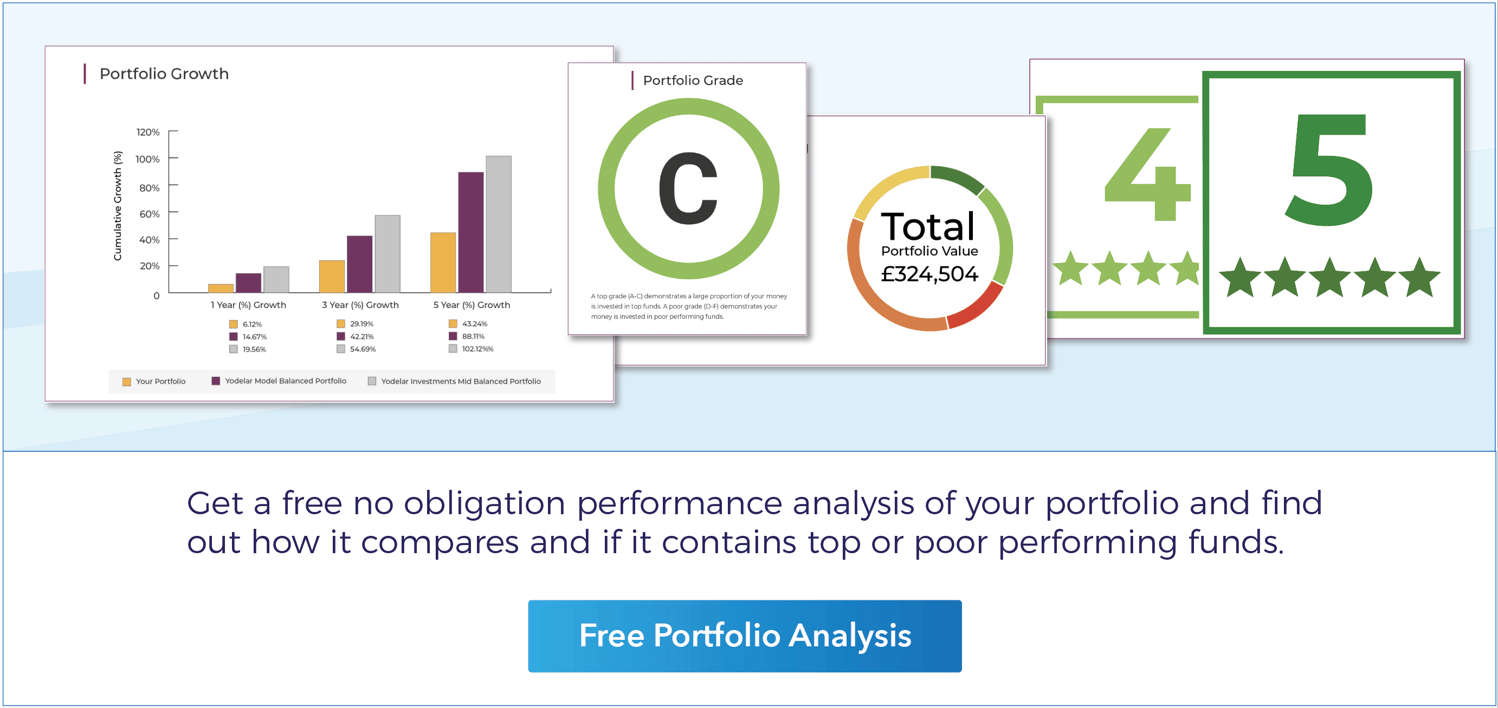The first several weeks of 2022 has been the worst start to a year for investment markets since the turn of the century, with 92% of funds experiencing losses. 55 of the 56 investment sectors averaged losses with the niche and high risk Latin American sector the only one to average growth. The period has been a difficult one for investors, many of whom have seen their portfolio value drop by considerable amounts.
With markets still struggling to regain any kind of positive traction, anxiety among investors is on the rise, with some even opting to sell off their portfolio holdings and revert to cash.
The big question for many is why are investment markets falling? Particularly as there is growing positivity that the end of the pandemic is in sight and restrictions removed.
In this report, we look at the reasons for the valuation drop and what it means for investors going forward.
Why Have Investment Values Dropped?
Rising Inflation
Inflation is a necessary evil as countries emerge from the pandemic, especially for the many countries, such as the UK and United States, that provided adequate fiscal stimulus. This helped prop up business and employee salaries even as many industries faced severe restrictions. This resulted in a significant increase in the number of people at home with disposable incomes which increased spending, with the demand for goods peaking during the height of the pandemic.
But as lockdowns and restrictions continued into 2021, major production and distribution channels were impacted which increased backlogs and raised prices.
There are a number of reasons for this. The pandemic and its impact prompted an increase in the number of people retiring. This is now being felt across many sectors, which combined with a reduction in immigration, and a greater than expected number of people choosing to live off of their savings and take time away from work, has left a shortage of skilled workers. However, this should all gradually resolve itself with more efficient productivity, a gradual increase in the workforce through a mixture of depleting assets and increased salaries, along with the easing of travel and immigration restrictions.
However, many economists predict that the stresses pushing inflation up will soon peak and lead to a gradual easing of pressure and cause inflation to begin to fall back by mid year.
Rising Interest Rates
Rising rates typically impact on bonds and fixed interest investments most as these types of investments drop in value as rates rise and grow in value as rates fall or remain low. For equity markets it can have a negative impact on valuations but history has shown that over time, the impact of inflation has little impact on long term investment growth.
In the short-term, rising interest rates will likely result in more market volatility with valuations impacted as a result of increasing borrowing costs and companies having to absorb the higher costs for raw materials or labor before passing along price increases to their customers.
With time, however, the impact is less obvious as markets have typically performed well during periods of higher inflation. But with current uncertainty, more volatility is likely to continue as investors make sense of higher inflation and impending higher interest rates.
Valuation & Productivity Issues
To stave off economic crisis during the pandemic the world’s Central Banks, led by the US Federal Reserve and the European Central Bank, created vast amounts of money. This has propped up many businesses and individuals, and actually led to an increase in spending. But as these measures are removed, it exposes the true state of many companies and sectors, some of which will struggle more than others and see revenue fall below what they received from various stimulus packages.
What’s more, some products could be in shorter supply as companies have pared back inventories during the uncertainty of the pandemic. In the leisure and tourism sectors there are reportedly staff shortages as those previously employed have ended up looking elsewhere during lockdown and decided not to return. This is all a recipe for inflation, at least in the short term.
Ordinarily, central banks would put up interest rates to reign inflation in. Upping the cost of borrowing takes the heat out of economic expansion and rising prices. However, authorities have made it clear they are willing to tolerate some short-term inflation to prioritise economic recovery and jobs. If inflation really takes off, then the authorities will have to act, but the US Federal Reserve and others have said they won’t be worried by figures more than 2% a year if they think it temporary.
Russian Invasion of Ukraine
The Russian invasion of Ukraine has resulted in European nations and the U.S to impose heavy sanctions on Russia which could easily go further as currently, they are not as severe as those previously imposed on Iran for example.
As a consequence of the current conflict, western banks are unlikely to want to be involved in supporting trade with Russia or financing activity in Russia, particularly as there is a risk that more severe sanctions could be around the corner.
Investors got a glimpse at which stocks may be hit hardest if the global conflict in Ukraine escalates further. Travel and leisure stocks were among the worst performers in the S&P 500, which are key markets for ‘value’ funds in particular.
A scenario of further escalation, with fighting intensifying, could create a lot of angst in the West and great pressure for more intervention. This scenario could result in more market turbulence as a consequence of further rises in the price of oil. ( In the short term rising oil prices typically halt market growth, but it has little correlation on investment performance in the medium to long term.)
However, for investors, it is important to note that Russia itself is not enough of a global player outside of oil and gas to have too much of an impact on UK investors. It’s an economy about the size of Italy, and accounts for about 3% of the eurozone exports. Russia is not a driver of global demand.
Consumer Spending Has Dropped
During times of severe economic turmoil, the consumer price index has typically dropped as consumers are more likely to be cautious with their spending. The two most turbulent periods of recent history saw the lowest index positions, these were the 2008 financial crisis and the start of the pandemic.
Since the pandemic, we’ve seen the index slowly rise as restrictions eased and the outlook for the economy improved. That was until midway through last year when the trajectory reversed. Since then, it’s slowly been falling back down.
Finally, we have soaring energy prices. The cost of gas for energy suppliers has more than doubled from last year and those costs are feeding down to larger energy bills for consumers. As a consequence there has been less spending, which will naturally impact on the profits and valuations of many companies across a wide range of sectors, which correlates to reduced growth for investment funds.
Falling Markets - What To Do When Investment Values Fall
Remaining Calm During Turbulent Markets
Markets have dropped due to a culmination of factors, which combined have created an environment of uncertainty and fear, which will almost always exacerbate negative conditions. But it is important not to lose sight of the fact that conditions will ultimately improve, and when they do, fear will naturally subside and growth will return.
Fear is the enemy of investing, it is an emotion that often supersedes rationale and increases the risk of making decisions that could negatively impact a medium to long-term strategy.
It is worth reminding ourselves every so often why we invest. This may seem somewhat obvious, but during times of investment stress it can help to avoid fear driven decisions and settle anxieties.
Most investors will have at least a 5 year investment horizon. (If someone's timeframe is lower than this then they should seriously consider other options or be in full acknowledgement of the risks with short term investments).
During times of investment stress it is useful to remember the following:
- The reason you invest a proportion of your wealth is so that over a defined period of time it grows in value to meet your investment objectives. For most, this will be a long-term strategy (5 years or more).
- During an investment journey you will experience periods where the value of your investments fall. This is and will always be a part of investing.
- It is only the value of your portfolio at the end of the defined time period that matters. Anything in between, is all part of the investment journey.
Of course, some investment strategies will do better than others, but it is through research and exploration that will help investors find the right portfolio that best fits their needs.
By reviewing your portfolio performance it can help to identify if your investments are performing well or underperforming. Yodelar’s portfolio analysis service will help to identify how each of the funds within your portfolio perform when compared against similar funds within the same sectors. This can help identify whether your current strategy has inefficiencies.
Growth Will Return
It’s human instinct to want to address the things that give us anxiety, and we are seeing that play out in the markets right now. Remember, the market has more than doubled since the beginning of the COVID-19 pandemic when we saw the market drop over 30% in March 2020.
Investors should be comforted by the fact markets have fully recovered from all past crises, and they will again this time.














